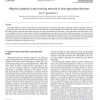Free Online Productivity Tools
i2Speak
i2Symbol
i2OCR
iTex2Img
iWeb2Print
iWeb2Shot
i2Type
iPdf2Split
iPdf2Merge
i2Bopomofo
i2Arabic
i2Style
i2Image
i2PDF
iLatex2Rtf
Sci2ools
125
click to vote
BIOSYSTEMS
2008
2008
Objective patterns in the evolving network of non-equivalent observers
The world's objective pattern is formed through consistent histories of quantum measurements originating as different branches of the same wave function. When we come close to the limits of measurement (either by approaching the speed of light or the values of the Planck's quantum), the relational effects come into place and the objectivity of world's pattern melts down. But when we are positioned far from these limits, we live in a comfortable area of the world common to all beings and approximating the objective environment (classical spacetime). Living systems are based on reflective cycles that can interact with relative predictability. Being quantum mechanical observers having different clocks, they generate perpetually evolving fitness landscape. I discuss how the perception of the objective is formed by the generation of same limits of iteration for the processes performed by non-equivalent observers and how the uniform time appears from its counting through thes...
Related Content
| Added | 08 Dec 2010 |
| Updated | 08 Dec 2010 |
| Type | Journal |
| Year | 2008 |
| Where | BIOSYSTEMS |
| Authors | Abir U. Igamberdiev |
Comments (0)

